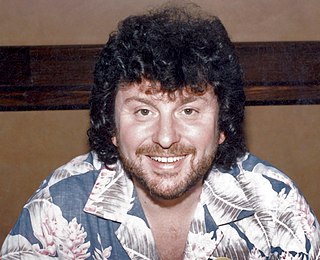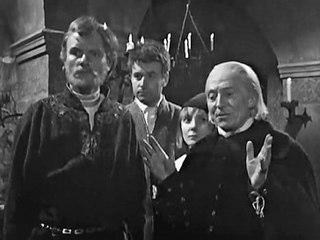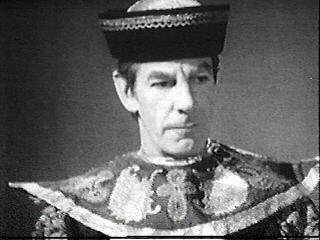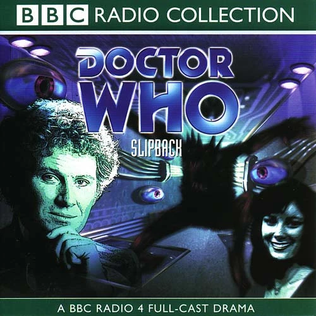Barbara Clegg | |
|---|---|
| Born | Barbara Diana Clegg 1 March 1926 Manchester, England |
| Occupations |
|
| Years active | 1956–1986 |
Barbara Clegg (born 1 March 1926) is a British actress and scriptwriter for television and radio.
Barbara Clegg | |
|---|---|
| Born | Barbara Diana Clegg 1 March 1926 Manchester, England |
| Occupations |
|
| Years active | 1956–1986 |
Barbara Clegg (born 1 March 1926) is a British actress and scriptwriter for television and radio.
She was born in March 1926 in Manchester, England. [1] Her parents were Herbert Clegg and Ethel Moores, sister of Sir John Moores who founded the Littlewoods Empire and they ran an artificial flower making factory in Manchester. She spent her early years in Gatley. [2]
After obtaining an English degree at Oxford University, Clegg decided to pursue a career in the theatre. Initial work as an understudy led to more substantial roles, most notably her turn as Cleopatra opposite Cyril Luckham's Caesar at the Liverpool Playhouse. A high-profile tour of Australia with Katharine Hepburn followed, performing plays such as The Merchant of Venice, but by this point Clegg was looking to move into television, a medium where more money could be made with roles in Emergency Ward 10 and The Dream Maker . She then started writing scripts and in 1961 contributed seven scripts for the television soap opera Coronation Street .
After writing for several radio and television serials, including for Crossroads and a radio dramatisation of The Chrysalids , Clegg was asked to submit ideas for the science fiction television series Doctor Who in 1981. Her storyline, titled The Enlighteners, involved a space-bound race using anachronistic sailing ships. Doctor Who script editor Eric Saward decided to use Clegg's story as the last part of a trilogy of three stories, known informally as the Black Guardian Trilogy, as it involved the return of the Black Guardian.
To integrate The Enlighteners into the trilogy, portions of the story were rewritten at the request of the production team and the Black and White Guardians replaced the originally planned "Enlighteners". Since the title could no longer refer to those entities, the story was renamed Enlightenment . She was the first woman to write a serial for Doctor Who.
The serial was Barbara Clegg's only commission for Doctor Who, other story line ideas being rejected by Saward, and later Andrew Cartmel. However one of those ideas, "Point of Entry", was later written up as a full script by Marc Platt and released as part of Big Finish's series of Doctor Who: The Lost Stories . Another "The Elite", was released in 2011. [3]
She wrote a book about the life of her Uncle Sir John Moores, called The Man Who Made Littlewoods, which was published just five weeks before his death in 1993.
Terminus is the fourth serial of the 20th season of the British science fiction television series Doctor Who, which was originally broadcast in four twice-weekly parts on BBC1 from 15 to 23 February 1983.

Robert Colin Holmes was a British television scriptwriter. For over 25 years he contributed to some of the most popular programmes screened in the UK. He is particularly remembered for his work on science fiction programmes, most notably his extensive contributions to Doctor Who, which included working as its script editor from 1974 to 1977.

The Keys of Marinus is the fifth serial in the British science fiction television series Doctor Who, which was first broadcast on BBC TV/BBC1 in six weekly parts from 11 April to 16 May 1964. Written by Terry Nation and directed by John Gorrie, the serial takes on a "mini-adventures" format, in which the First Doctor, his granddaughter Susan Foreman, and her teachers Ian Chesterton, and Barbara Wright search for four keys to restore the Conscience of Marinus, a computer which maintains law and order. The group travel to two cities, a jungle, and an icy wasteland in search of the keys.
The Ultimate Foe is the fourth and final serial of the larger narrative known as The Trial of a Time Lord which encompasses the whole of the 23rd season of the British science fiction television series Doctor Who. It was first broadcast in two weekly parts on BBC1 on 29 November and 6 December 1986. This segment is also cited in some reference works under its working title of Time Incorporated. The title The Ultimate Foe is never used on-screen and was first used in relation to these episodes for the 1988 novelisation, with the two episodes that comprise the serial being referred to as The Trial of a Time Lord Parts Thirteen and Fourteen. This was the last story to feature Colin Baker as the Sixth Doctor, as Baker declined to do the regeneration for the following story, Time and the Rani.
Mawdryn Undead is the third serial of the 20th season of the British science fiction television series Doctor Who. It was originally broadcast in four twice weekly parts on BBC1 from 1 to 9 February 1983.
Enlightenment is the fifth serial of the 20th season of the British science fiction television series Doctor Who, which was originally broadcast in four twice-weekly parts on BBC1 from 1 to 9 March 1983. It was the 127th serial of the series, and was written by Barbara Clegg and directed by Fiona Cumming, making it the first serial to be both written and directed by women.

John Turner, known professionally as John Nathan-Turner, was an English television producer. He was the ninth producer of the long-running BBC science fiction series Doctor Who and the final producer of the series' first run on television. He finished the role having become the longest-serving Doctor Who producer and cast Peter Davison, Colin Baker and Sylvester McCoy as the Fifth, Sixth and Seventh Doctors, respectively.

Vislor Turlough is a fictional character played by Mark Strickson in the long-running British science fiction television series Doctor Who. He was a companion of the Fifth Doctor, being a regular in the programme from 1983 to 1984. Turlough appeared in 10 stories.
Attack of the Cybermen is the first serial of the 22nd season of the British science fiction television series Doctor Who, which was first broadcast in two weekly parts on 5 and 12 January 1985. It was credited to the pseudonymous author "Paula Moore"; the level of contributions made by Paula Woolsey, Eric Saward and Ian Levine have been disputed. Beginning with this serial and continuing for the remainder of Season 22, episodes were 45 minutes in length ; for syndication, in some markets, this serial is re-edited into four 25-minute segments.
The Armageddon Factor is the sixth and final serial of the 16th season of the British science fiction television series Doctor Who, which was first broadcast in six weekly parts on BBC1 from 20 January to 24 February 1979. It was the last to feature Mary Tamm as Romana.
Earthshock is the sixth serial of the 19th season of the British science fiction television series Doctor Who. It was first broadcast in four twice-weekly parts on BBC1 from 8 to 16 March 1982. This serial marks the final regular appearance of Matthew Waterhouse as Adric and his climactic death, with the final episode featuring unique silent credits in loving memory of the character. It is also the first to feature the Cybermen since Revenge of the Cybermen in 1975.
Resurrection of the Daleks is the fourth serial of the 21st season in the British science fiction television series Doctor Who, which was first broadcast in two weekly parts on BBC1 between 8 February and 15 February 1984. The serial was intended to be transmitted as four 23-minute episodes but a late scheduling change by the BBC meant that it was transmitted as two episodes of 46 minutes; reruns restored it to its intended format.
Revelation of the Daleks is the sixth and final serial of the 22nd season in the British science fiction television series Doctor Who, which was first broadcast in two weekly parts on 23 and 30 March 1985. This was the final serial to be broadcast in 45-minute episodes; this format would return 20 years later when the series resumed in 2005. Revelation of the Daleks is the only time the Sixth Doctor encountered the Daleks in a television story.
Eric Saward is a British radio scriptwriter who worked for the BBC as a television script editor and screenwriter on the science fiction series Doctor Who from 1982 until 1986. He wrote the stories The Visitation (1982), Earthshock (1982), Resurrection of the Daleks (1984) and Revelation of the Daleks (1985).

The Crusade is the sixth serial of the second season in the British science fiction television series Doctor Who. Written by David Whitaker and directed by Douglas Camfield, the serial was broadcast on BBC1 in four weekly parts from 27 March to 17 April 1965. In this serial, the First Doctor and his travelling companions Ian Chesterton, Barbara Wright, and Vicki arrive in 12th century Palestine during the Third Crusade, and find themselves entangled in the conflict between King Richard the Lionheart and Saladin. They also meet King Richard's sister Lady Joanna and Saladin's brother Saphadin.

The Celestial Toymaker is the mostly missing seventh serial of the third season in the British science fiction television programme Doctor Who, which was first broadcast in four weekly parts from 2 to 23 April 1966.
Frontios is the third serial of the 21st season of the British science fiction television series Doctor Who, which was first broadcast in four twice-weekly parts on BBC1 from 26 January to 3 February 1984.

Slipback is a radio audio drama based on the long-running British science fiction television series Doctor Who, produced by the BBC and first broadcast in six episodes on BBC Radio 4 from 25 July to 8 August 1985, as part of a children's magazine show called Pirate Radio Four. It was later released on cassette and CD, most recently by BBC Audio and free with the 27 April 2010 edition of The Daily Telegraph newspaper via WHSmith.

The twentieth season of British science fiction television series Doctor Who began on 3 January 1983 with the story Arc of Infinity, and ended 16 March 1983 with The King's Demons. A 20th Anniversary special, "The Five Doctors", followed in November 1983. John Nathan-Turner produced this series, with Eric Saward script editing.